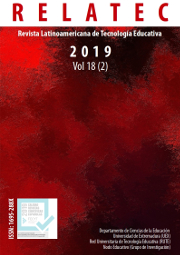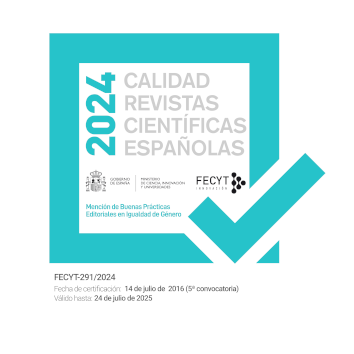Um Panorama Sobre a Integração do Conhecimento Tecnológico na Formação de Professores de Ciências
DOI:
https://doi.org/10.17398/1695-288X.18.2.219Palavras-chave:
TPACK, Formação de Professores, Ensino de Ciências, Tecnologia educacionalResumo
Saber formar professores de ciências na sociedade da informação é uma necessidade desafiadora. Para estudar como as tecnologias são mobilizadas e integradas na prática educacional, o referencial teórico do Conhecimento Tecnológico, Pedagógico do Conteúdo, mais conhecido como TPACK, foi utilizado. Portanto, este trabalho é uma revisão sistemática da literatura de artigos presentes na bases de dados da CAPES/MEC (Brasil) no período de 2006-2018 sobre o uso do referencial teórico do TPACK. O objetivo deste trabalho foi identificar como o referencial do TPACK é estudado nas publicações sobre formação de professores de Ciências, observando os focos de pesquisa para montar um panorama sobre as contribuições no uso do TPACK. Foram utilizados os procedimentos metodológicos propostos por Sampaio e Mancini (2007) para revisão de literatura de artigos. As principais tendências de pesquisa envolviam estudos sobre a confiança em instrumentos para avaliar dimensões de conhecimento no modelo teórico do TPACK, barreiras para o desenvolvimento do TPACK e natureza do TPACK. Os resultados permitiram elencar semelhanças e diferenças entre tendências metodológicas, e de foco de pesquisa, bem como identificar lacunas sobre o uso do modelo TPACK em áreas importantes como o Ensino de física e para a formação de professores.
Downloads
Referências
André, M. (2001). Pesquisa Em Educação: Buscando Rigor e Qualidade. Cadernos De Pesquisa, 113, 51-64.
Angeli, C., & Valanides, N. (2009). Epistemological And Methodological Issues For The Conceptualization, Development, And Assessment Of Ict-tpack: Advances In Technological Pedagogical Content Knowledge (TPACK). Computers & Education, 52, 154–168.
Archambault, L.M. Barnett, J.H. (2010). Revisitando O Conhecimento Pedagógico De Conteúdo Em Tecnologia: Explorando O Framework TPACK. Computadores E Educação, 55, 1656 - 1662.
Bardin, L. (2011). Análise De Conteúdo. São Paulo: Edições 70.
Blonder, R. Shelley, R. (2015). I Like Facebook: Exploring Israeli High School Chemistry Teachers’ TPACK And Self-efficacy Beliefs. Educ Inform Technol 1-28.
Bower, M; Highfield, K; Furney, P; Mowbray, L. (2013). Supporting Pre‐service Teachers' Technology‐enabled Learning Design Thinking Through Whole Of Programme Transformation. Educational Media International 50(1), P P.39‐50. 2013
Brantley-dias, L. Ertmer, M. A. (2013) Goldilocks And TPACK. Journal Of Research On Technology In Education, 46(2), 103-128, doi: 10.1080/15391523.2013.10782615
Chai, C-s. Koh, J. H-l & Tsai, C.C. (2013). A Review Of Technological Pedagogical Content Knowledge. Educational Technology & Society, 16(2), P. 31–51. 2013.
Chen, Y‐h. Jang, S ‐ J. Chen, P ‐ J. (2015). Using Wikis And Collaborative Learning For Science Teachers' Professional Development. Journal Of Computer Assisted Learning , 31, 330‐344
Chittleborough, G (2014). Learning How To Teach Chemistry With Technology: Pre‐service Teachers' Experiences With Integrating Technology Into Their Learning And Teaching. Journal Of Science Teacher Education , 25(4), Pp.373‐393.
Coll, C. Monereo, C. (Eds.) (2010). Psicologia Da Educação Virtual: Aprender E Ensinar Com As Tecnologias Da Informação E Comunicação. Artmed Editora S.A. Rio Grande Do Sul.
Cox, S., & Graham, C. R. (2009) Diagramming TPACK In Practice: Using A And Elaborated Model Of The Tpck Framework To Analyse And Depict Teacher Knowledge. Techtrends, 53, 60-69.
Groth, R., Spickler, D., Bergner, J., & Bardzell, M. (2009). A Qualitative Approach To Assessing Technological Pedagogical Content Knowledge. Contemporary Issues In Technology And Teacher Education, 9, 392–411.
Hardy, M. (2010). Enhancing Preservice Mathematics Teachers’ TPACK. Journal Of Computers In Mathematics And Science Teaching, 29(1), 73–86.
Hammond, T. C., & Manfra, M. M. (2009). Giving, Prompting, Making: Aligning Technology And Pedagogy Within TPACK For Social Studies Instruction. Contemporary Issues In Technology And Teacher Education, 9(2).
Harris, J. Grandgenett, N., & Hofer, M. (2007). Testing A TPACK-based Technology Integration Assessment Rubric. In C. Crawford, D. A. Willis, R. Carlesen, I. Gibson, K. Mcferrin, J. Harris, J., & Hofer, M. J. (2011). Technological Pedagogical Content Knowledge (TPACK) In Action: A Descriptive Study Of Secondary Teachers’ Curriculum-based, Technology-related Instructional Planning. Journal Of Research On Technology In Education, 43, 211–229.
Harvey, D. E Caro, R. (2017). Building TPACK In Preservice Teachers Through Explicit Course Design. Techtrends, 61(2), 106-114.
Hosseini, Z. (2016). The Potential Of Directed Instruction To Teach Effectively Technology Usage. World Journal On Educational Technology, 8(3), 172-179.
Janssen, Noortje, & Lazonder, Ard W. (2015). Implementing Innovative Technologies Through Lesson Plans: What Kind Of Support Do Teachers Prefer? Journal Of Science Education And Technology, 24(6), 910-920.
Johnson, R. B. Onwuegbuzie, A. J. (2004). Mixed Methods Research: A Research Paradigm Whose Time Has Come. Educational Researcher, 33(7), 14-26.
Kabakci Yurdakul, L. (2018). Modeling The Relationship Between Pre-service Teachers’ TPACK And Digital Nativity. Educational Technology Research And Development. 66. 10.1007/S11423-017-9546-x.
Kabakci Yurdakul, I. Coklar, A. N. (2014). Modeling Preservice Teachers’ TPACK Competencies Based On Ict Usage. Journal Of Computer Assisted Learning, 30(4), 363‐376.
Kimmons, R., & Hall, C. (2018). How Useful Are Our Models? Pre-service And Practicing Teacher Evaluations Of Technology Integration Models. Techtrends, 62(1), 29-36.
Koehler, M.J.; Mishra, P. (2005). What Happens When Teachers Design Educational Technology? The Development Of Technological Pedagogical Content Knowledge. J. Educ. Comput. Res., 32, 131–152.
Koelher, M.J. Mishra, P. Yahya, K. (2007). Tracing The Development Of Teacher Knowledge In A Design Seminar: Integrating Content, Pedagogy And Technology. Computers & Education, 49(3), 740-762.
Koh, J. Chai, C. Tsai, C‐c. (2013). Examining Practicing Teachers’ Perceptions Of Technological Pedagogical Content Knowledge (TPACK) Pathways: A Structural Equation Modeling Approach. Instructional Science , 41, 793‐809.
Kontkanen, S; Dillon, P; Valtonen, T; Renkola, S; Vesisenaho, M; Väisänen, P. (2016). Pre-service Teachers’ Experiences Of Ict In Daily Life And In Educational Contexts And Their Proto-technological Pedagogical Knowledge. Education And Information Technologies, 21(4), 919-943.
Kopcha, T. Ottenbreit‐leftwich, A. Jung, J. Baser, D. (2014). Examining The TPACK Framework Through The Convergent And Discriminant Validity Of Two Measures. Computers & Education, 78, 87‐96
Lee, C‐j ; Kim, C. (2014). An Implementation Study Of A TPACK‐based Instructional Design Model In A Technology Integration Course. Educational Technology Research And Development, 62(4), 437‐460.
Lee, M & Tsai, C (2008). Exploring Teachers’ Perceived Self Efficacy And Technological Pedagogical Content Knowledge With Respect To Educational Use Of The World Wide Web. Instructional Science, 38(1), 1-21. doi: 10.1007/s11251-008-9075-4
Lee, M.-h., Wu, Y.-t., & Tsai, C.-c. (2009). Research Trends In Science Education From 2003 To 2007: A Content Analysis Of Publications In Selected Journals. International Journal Of Science Education, 31(15), 1999-2020.
Lin, T‐c. Tsai, C‐c. Chai, C. S. Lee, M-h. (2013). Identifying Science Teachers' Perceptions Of Technological Pedagogical And Content Knowledge (TPACK). Journal Of Science Education And Technology , 22, P.325‐336. 2013
Luik, P., Taimalu, M., & Suviste, R. (2018). Perceptions Of Technological, Pedagogical And Content Knowledge (TPACK) Among Pre-service Teachers In Estonia. Education And Information Technologies, 23(2), 741-755.
Mckenney, S., Boschman, F., Pieters, J. (2016). Collaborative Design Of Technology-enhanced Learning: What Can We Learn From Teacher Talk? Techtrends, 60, 385. Https://Doi.Org/10.1007/S11528-016-0078-8
Mishra, P.; Koehler, M. (2006). Technological Pedagogical Content Knowledge: A Framework For Teacher Knowledge. Teachers College Record, 108(6), 1017-1054,.
Maeng, J. L. Mulvey, B. K. ; Smetana, L. K. ; Bell, R. L. (2013). Preservice Teachers' TPACK: Using Technology To Support Inquiry Instruction. Journal Of Science Education And Technology, 22, 838. doi: 10.1007/s10956-013-9434-z
Niess, M.L. (2005). Preparing Teachers To Teach Science And Mathematics With Technology: Developing A Technology Pedagogical Content Knowledge. Teaching And Teacher Education, 21, 509-523.
Niess, M. L. (2008). Guiding Preservice Teachers In Developing TPACK. In The American Association Of Colleges For Teacher Education (Aacte) Committee On Innovation And Technology (Eds.), Handbook Of Technological Pedagogical Content Knowledge (TPACK) For Educators (pp. 223–250). New York: Routledge
Nogueira, F. Pessoa, T. Gallego, M-j. (2015). Desafio E Oportunidades Do Uso Da Tecnologia Para A Formação Continuada De Professores: Uma Revisão Em Torno Do TPACK Em Portugal, Brasil E Espanha. Tear: Revista De Educação Ciência E Tecnologia, Canoas, 4(2).
Pamuk, S., Ergun, M., Cakir, R., Yilmaz, H., & Ayas, B. (2015). Exploring Relationships Among TPACK Components And Development Of The TPACK Instrument. Education And Information Technologies, 20(2), 241-263.
Price, & R. Weber (Eds.) (2010). Proceedings Of The Society For Information. Technology & Teacher Education International Conference. (pp. 3833–3840). Chesapeake, Va: Aace
Polly, D. Rock, T. (2016). Elementary Education Teacher Candidates' Integration Of Technology In The Design Of Interdisciplinary Units. Techtrends, 60(4), 336-343.
Reyes, V. C.; Nadya Jr, R.; Gregory, S., & Doyle, H. (2016). An Exploratory Analysis Of TPACK Perceptions Of Pre-service Science Teachers: A Regional Australian Perspective. International Journal Of Information And Communication Technology Education, 12(4), 1-14.
Rienties, B. Brouwer, N. Bohle Carbonell, K. Townsend, D. Rozendal, A‐p. Van Der Loo, J. Dekker, P. Lygo Baker, S. (2013). Online Training Of TPACK Skills Of Higher Education Scholars: A Cross‐institutional Impact Study. European Journal Of Teacher Education,36(4), 480-495.
Rolando, L. G. R., Luz, M. R. M. P., & Salvador, D. F. (2015). O Conhecimento Tecnológico Pedagógico do Conteúdo no Contexto Lusófono: uma revisão sistemática da literatura. Revista Brasileira de Informática Na Educação, 23(3), 174–190. http://doi.org/10.5753/rbie.2015.23.03.174
Sahin, I. (2011). Development Of Survey Of Technological Pedagogical And Content Knowledge (TPACK). Turkish Online Journal Of Educational Technology, 10(1), 97-105.
Sampaio, R. F., & Mancini, M. C. (2007). Estudos de revisão sistemática: um guia para síntese criteriosa da evidência científica. Revista Brasileira de Fisioterapia, 11(1), 83–89.
Sheffield, R; Dobozy, E; Gibson, D; Mullaney, J, & Campbell, C. (2015). Teacher Education Students Using TPACK In Science: A Case Study. Educational Media International, 52(3), 227-238.
Shulman, L. S. (1986) Those Who Understand: Knowledge Growth In Teaching. Educational Researcher, 15, 4-14.
Tsai, C.-c. Wen, L. M. C. (2005). Research And Trends In Science Education From 1998 To 2002: A Content Analysis Of Publication In Selected Journals. International Journal Of Science Education, 27(1), 3-14
Tondeur, J.; Hermans, R.; Van Braak, J.; Valke, M. (2008). Exploring The Link Between Teachers’ Educational Belief Profiles And Different Types Of Computer Use In The Classroom. Computers In Human Behavior, 24, 2541-2553.
Valtonen, T., Kukkonen, J., Kontkanen, S., & Sointu, E. (2018). Differences In Pre‐service Teachers' Knowledge And Readiness To Use Ict In Education. Journal Of Computer Assisted Learning, 34(2), 174-182.
Verkerk, M. J. Hoogland, J. Van Der Stoep, J. Vries, M. J. (2018). Filosofia Da Tecnologia: Uma Introdução. 1. Ed. Viçosa, Minas Gerais: Ultimato, 2018.
Voogt, J., Fisser, P., Pareja Roblin, N., Tondeur, J., & van Braak, J. (2013). Technological pedagogical content knowledge - a review of the literature. Journal of Computer Assisted Learning, 29(2), 109–121. http://doi.org/10.1111/j.1365-2729.2012.00487.x
Young, J. R. Young, J. L. Shaker, Z. (2012). Technological Pedagogical Content Knowledge (TPACK) Literature Using Confidence Intervals. Techtrends, 56(5), 25‐33
Yin, R. (2001). Estudo De Caso: Planejamento E Métodos. Ed. Bookman. Porto Alegre.
Zelkowski, J. Gleason, J. Cox, D. C. Bismarck, S. (2013). Developing And Validating A Reliable TPACK Instrument For Secondary Mathematics Preservice Teachers. Journal Of Research On Technology In Education, 46, 173.
Downloads
Publicado
Edição
Secção
Licença
Los autores/as que publiquen en esta revista aceptan las siguientes condiciones:
1. Los autores/as conservan los derechos de autor y ceden a la revista el derecho de la primera publicación, con el trabajo registrado con la licencia Creative Commons Reconocimiento-NoComercial-SinObraDerivada 4.0 International (CC BY-NC-ND), que permite a terceros utilizar lo publicado siempre que mencionen la autoría del trabajo y a la primera publicación en esta revista.
2. Los autores/as pueden realizar otros acuerdos contractuales independientes y adicionales para la distribución no exclusiva de la versión del artículo publicado en esta revista (p. ej., incluirlo en un repositorio institucional o publicarlo en un libro) siempre que indiquen claramente que el trabajo se publicó por primera vez en esta revista.
3. Se permite y recomienda a los autores/as a publicar su trabajo en Internet (por ejemplo en páginas institucionales o personales) antes y durante el proceso de revisión y publicación, ya que puede conducir a intercambios productivos y a una mayor y más rápida difusión del trabajo publicado (vea The Effect of Open Access).









